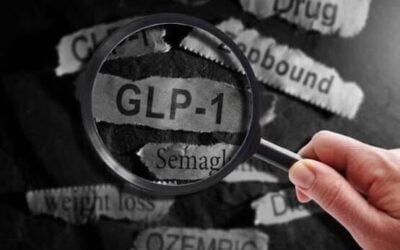Node Smith, ND
An interesting study was recently published linking alterations in glucose metabolism and stress-induced mental changes.1 The study was conducted using a murine model, however generally known connections between chronic stress and mental disturbances such as depression, and the widespread prevalence of both depressive disorders and dysfunctions in glucose metabolism support its possible human relevance.
Chronic stress, a generally accepted precursor for developing certain psychiatric conditions like depression
Chronic stress is a generally accepted risk factor for developing certain psychiatric conditions, especially depression. The fact that the brain necessitates such a great deal of glucose, and that stress is known to impact glucose metabolism has lead researchers at the Department for Psychiatry and Psychotherapy at the Mainz University Medical Center and the German Resilience Center (DRZ) in Mainz to look for a link between these two phenomena. The team has indeed discovered that stress-induced mental changes can be directly linked to glucose dysfunctions. Furthermore, normalizing the stress-impacted changes in blood sugar levels using the pharmaceutical drug, empagliflozin, restored spatial memory as well as glucose balance.
Three questions led researchers of the Translational Psychiatry lab of Professor Marianne Müller at the University Medical Center of Johannes Gutenberg University Mainz (JGU):
Why does chronic stress lead to psychiatric disorders in some people (susceptible) while others, who experience similar life events, remain healthy (resilient)?
Does chronic stress lead to stress-dependent changes in glucose metabolism?
Are stress, glucose metabolism, and psychiatric alterations directly linked?
In this specific study, researchers looked at changes in glucose metabolism over time in animals under chronic social stress. Stress was seen to disrupt glucose levels and metabolism in both the brain and periphery. The defects in glucose also were found to lead to defects in spatial memory as well. Stressed animals showed elevated blood glucose levels soon after stress and the brain was seen to be hyperglycemic while having reduced ability to uptake glucose.
Not all animals had the same response to chronic social stress
Introduction of the anti-diabetic medication, empaglifozin, caused a normalization of blood glucose as well as improvements in spatial memory. However, not in all animals. Not all animals had the same response to the chronic social stress. Animals whose blood glucose was not seen to alter after stress, also had no changes in spatial memory. These animals, when given the anti-diabetic medication, actually had the opposite effect on their spatial memory, it worsened.
Chronic stress can impair spatial memory via altered glucose levels
“Our results demonstrate that chronic stress can impair spatial memory through alterations in glucose levels and that intact glucose metabolism is pivotal for memory-related processes,” explained Dr. Michael van der Kooij, who designed the study in the Mainz-based Translational Psychiatry lab. “Furthermore, the findings highlight the importance of individuality since all subjects experienced the same stress, but only a proportion was susceptible as these developed disturbances at the levels of glucose metabolism and, hence, cognitive impairments. The fact that stress-susceptibility or resilience could be predicted early after stress by measuring blood glucose levels fuels the belief that perhaps in humans with stress-related disorders, such as depression, abnormal glucose metabolism may also play a major role and that the classification strategies as employed in the current study could enhance treatment efficacy.”
Source:
- van der Kooij MA, Jene T, Treccani , et al. Chronic social stress-induced hyperglycemia in mice couples individual stress susceptibility to impaired spatial memory. PNAS. October 9, 2018 https://doi.org/10.1073/pnas.1804412115
Photo by Tom Pumford on Unsplash
 Node Smith, ND, is a naturopathic physician in Portland, OR and associate editor for NDNR. He has been instrumental in maintaining a firm connection to the philosophy and heritage of naturopathic medicine among the next generation of docs. He helped found the first multi-generational experiential retreat, which brings elders, alumni, and students together for a weekend camp-out where naturopathic medicine and medical philosophy are experienced in nature. Four years ago he helped found the non-profit, Association for Naturopathic ReVitalization (ANR), for which he serves as the board chairman. ANR has a mission to inspire health practitioners to embody the naturopathic principles through experiential education. Node also has a firm belief that the next era of naturopathic medicine will see a resurgence of in-patient facilities which use fasting, earthing, hydrotherapy and homeopathy to bring people back from chronic diseases of modern living; he is involved in numerous conversations and projects to bring about this vision.
Node Smith, ND, is a naturopathic physician in Portland, OR and associate editor for NDNR. He has been instrumental in maintaining a firm connection to the philosophy and heritage of naturopathic medicine among the next generation of docs. He helped found the first multi-generational experiential retreat, which brings elders, alumni, and students together for a weekend camp-out where naturopathic medicine and medical philosophy are experienced in nature. Four years ago he helped found the non-profit, Association for Naturopathic ReVitalization (ANR), for which he serves as the board chairman. ANR has a mission to inspire health practitioners to embody the naturopathic principles through experiential education. Node also has a firm belief that the next era of naturopathic medicine will see a resurgence of in-patient facilities which use fasting, earthing, hydrotherapy and homeopathy to bring people back from chronic diseases of modern living; he is involved in numerous conversations and projects to bring about this vision.





















